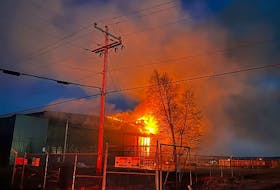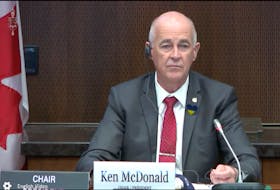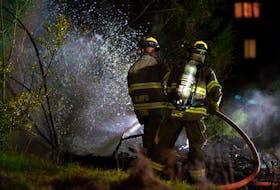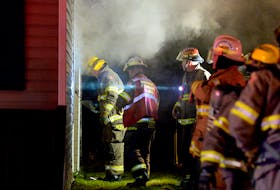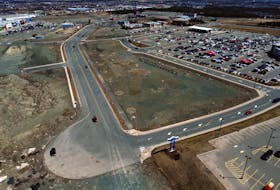Spraying of Tordon 101 along provincial highways is not endangering public health and safety, according to provincial government representatives and staff monitoring the ongoing spray program.
The spraying is being done by Newfoundland and Labrador Vegetation Control (NLVC) for the provincial Department of Transportation and Works.
It is meant to control vegetation in selected areas along the highways, where there has been mechanical brushclearing in an attempt to improve visibility and reduce the number of moose-vehicle accidents.
Sue Dyer was stopped on the side of the Bay D'Espoir highway Wednesday, phoning in search of information about the spray program, after coming across a chemically treated area.
"It's burnt the eyes out of me and the smell's horrible," Dyer said, adding she tried calling two numbers provided on "for more information" signs posted - one being a provincial government contact and the other a line for NLVC.
After nine calls, she said, she was unable to connect with anyone who could directly respond to her questions.
Meanwhile, Liberal environment critic Randy Edmunds, MHA for Torngat Mountains, issued a statement calling on the province to stop using Tordon 101 along the province's highways.
"I urge government to immediately stop their spray program and implement province-wide public consultation sessions to find safer alternatives for brush removal," he said.
Information and regulation
On the question of available information, The Telegram was told by an employee at NLVC the owner was the only one who could respond to questions. A message there received no response as of press time.
But a call to the provincial government number was met with a swift response from government staff.
Karen Linfield is with the pesticides enforcement section of the provincial Department of Environment and Conservation and spoke with The Telegram.
She acknowledged the noticeable smell in areas where Tordon 101 is sprayed.
"There is a smell. But the smell is one thing. That doesn't mean the active ingredient is floating around in the air," she said.
She compared smelling the chemical to catching a smell of manure in the air near a farmer's field.
"Once (the chemical) has been applied to the foliage, it will dry to the foliage and it's not going to go anywhere," she said.
Linfield said the spray is approved for use by regulators and is being applied as per the manufacturer's direction.
She said the signs with the two contact numbers are left for days, even though foliage dries in, she estimated, a couple of hours.
Notices of the spraying were printed in The Telegram and have been circulated online by provincial environmental organizations.
Linfield was asked about the purpose of spraying in burnt out areas along the Bay D'Espoir highway, a question raised by Dyer.
She said the area is already seeing regrowth along the roadside, leading to the decision to spray.
Health Canada approved
Tordon 101 includes the active ingredient 2,4-D (2,4-dichlorophenoxyacetic acid) - banned in April by the provincial government for use by homeowners on their lawns.
Yet the government stated the chemical could still be permitted for industrial uses, such as the current highway spray program.
Health Canada has completed reviews centred on the two main, active ingredients - 2,4-D and picloram - within the last five years. A review of picloram products was completed in 2009. In 2008, 2,4-D products were reviewed and cleared as meeting modern health and environmental standards.
"Health Canada understands that the public may have concerns over the use of pesticides and would like to convey that all registered pesticides undergo a thorough science-based risk assessment and must meet strict health and environmental standards before being approved for use in Canada," states an informational note on the 2,4-D review.
Provincially, "the herbicides used for road maintenance are applied in accordance with pesticides control regulations under the Environmental Protection Act and all spraying work is vetted through the Department of Environment and Conservation," stated a joint response to questions from representatives with the provincial Department of Environment and Conservation and the Department of Transportation and Works.
"Staff of the pesticides enforcement section are quite willing to speak with the public to explain the regulations regarding the (spray) program."


